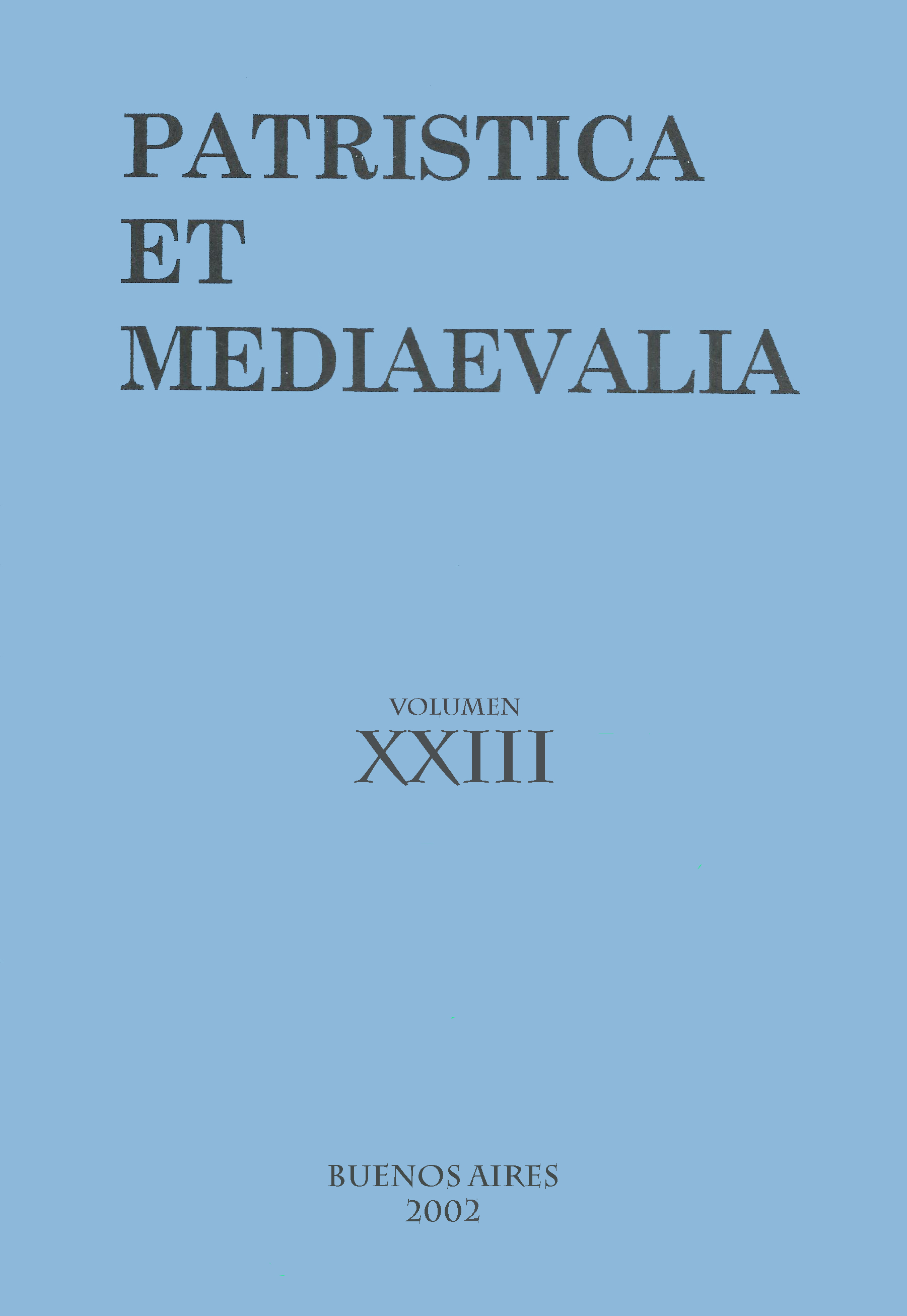Del hombre como interlocutor divino: hacia la antropología de Juan Escoto
Resumen
Con especial atención a la narrative bíblica, Eriúgena trabaja, de manera original, acerca del rol de la naturaleza humana en el plan de la Creación. Imagen divina y semejanza, características distintivas del hombre, se analizan desde la perspectiva de los atributos divinos y de la ignorancia divina. Y, finalmente, se sugiere una relación de equidad entre la imagen y el prototipo.Descargas
Citas
Allard, G. (1973). La structure littéraire de la composition du De divisione naturae. En O’Meara, J. & Bieler, L. (eds.). The Mind of Eriugena: papers of a colloquium, Dublin, 14-18 July, 1970. Dublin: Irish University Press, 147-157.
Allard, G. (1990). Medietas chez Jean Scot. En Beierwaltes, W. (ed.). Begriff und Metapher: Sprachform des Denkens bei Eriugena, VII. Internationalen Eriugena-Colloquiums, 26.-29. Juli 1989. Heidelberg: Winter, 95-107.
Beierwaltes, W. (1994). Unity and Trinity in East and West. En McGinn, B. & Otten, W. (eds.). Eriugena, East and West, Papers of the 8th International Symposium of the Society for the Promotion of Eriugenian Studies, Chicago and Notre Dame, 18-20 October, 1991. Notre Dame: University of Notre Dame Press, 209-231.
Bertin, F. (1977). Les origines de l’homme chez Jean Scot. En Roques, R. (ed.). Jean Scot Érigène et l’Histoire de la Philosophie, Colloques internationaux, Laon, 7-12 juillet 1975. Paris: CNRS, 307-314.
Bonafede, G. (1971). Presencia de San Agustín en Escoto Eriugena. Augustinus, 16, 263-286.
Brunhes, G. (1903). La Foi chrétienne et la philosophie, Au temps de la Renaissance Carolingienne. Paris: Beauchesne.
Cappuyns, M. (1933). Jean Scot Érigène, Sa vie, son oeuvre, sa pensée. Louvain: Abbaye du Mont-César.
Carabine, D. (1994). Eriugena’s Use of the Symbolism of Light, Cloud and Darkness in the Periphyseon. En McGinn, B. & Otten, W. (eds.). Eriugena, East and West, Papers of the 8th International Symposium of the Society for the Promotion of Eriugenian Studies, Chicago and Notre Dame, 18-20 October, 1991. Notre Dame: University of Notre Dame Press, 141-152.
De Lubac, H. (1988). La posteridad espiritual de Joaquín de Fiore. Madrid: Encuentros.
D’Onofrio, G. (1994). The Concordia of Augustine and Dionysius: Toward a Hermenutic of the Disagreement in John the Scot’s Periphyseon. En McGinn, B. & Otten, W. (eds.). Eriugena, East and West, Papers of the 8th International Symposium of the Society for the Promotion of Eriugenian Studies, Chicago and Notre Dame, 18-20 October, 1991. Notre Dame: University of Notre Dame Press, 115-140.
Gersh, S. (1980). Omnipresence in Eriugena: Some Reflections on Augustino-Maximiam Elements in the Periphyseon. En Beierwaltes, W. (ed.). Eriugena, Studien zu seinen Quellen, Vorträge des III. Internationales Eriugena-Colloquiums, Freiburg im Breisgau, 27-30 August 1979. Heidelberg: Winter, 54-74.
Gracia, J. (1978). Ontological Characterization of the Relation Between Man and Created Nature in Eriugena. Journal of the History of Philosophy, 16, 155-166.
Jeauneau, E. (1969). Jean Scot, Homélie sur le Prologue de Jean, Introduction, texte critique, traduction et notes. Paris: CERF.
Jeauneau, E. (1986). Jean Scot et l’ironie. En Allard, G. (ed.). Jean Scot Écrivain: actes du IVe Colloque International, Montréal, 28 août-2 septembre 1983. Paris: Vrin/Montréal: Bellarmin, 13-28.
McEvoy, J. (1990). Metaphors of Light and Metaphysics of Light in Eriugena. En Beierwaltes, W. (ed.). Begriff und Metapher: Sprachform des Denkens bei Eriugena, VII. Internationalen Eriugena-Colloquiums, 26.-29. Juli 1989. Heidelberg: Winter, 149-167.
McGinn, B. (1977). The Negative Element in the Anthropology of John the Scot. En Roques, R. (ed.). Jean Scot Érigène et l’Histoire de la Philosophie, Colloques internationaux, Laon, 7-12 juillet 1975. Paris: CNRS, 315-325.
Moran, D. (1986). ‘Officina omnium’ or ‘Notio quaedam intellectualis in mente divina aeternaliter facta’: The Problem of the Definition of Man in the Philosophy of John Scottus Eriugena. En Wenin, C. (ed.). L’Homme et son Univers au Moyen Âge, Actes du VII Congrès International de Philosophie Médiévale, 30 août-4 septembre 1982. Louvain: Editions de l'Institut supérieur de philosophie, 195-204.
O’Meara, J. (1986). Translating Eriugena. En Allard, G. (ed.). Jean Scot Écrivain: actes du IVe Colloque International, Montréal, 28 août-2 septembre 1983. Paris: Vrin/Montréal: Bellarmin, 115-128.
Otten, W. (1991). The Anthropology of Johannes Scottus Eriugena. Leiden: Brill.
Perl, E. (1994). Metaphysics and Christology in Maximus Confessor and Eriugena. En McGinn, B. & Otten, W. (eds.). Eriugena, East and West, Papers of the 8th International Symposium of the Society for the Promotion of Eriugenian Studies, Chicago and Notre Dame, 18-20 October, 1991. Notre Dame: University of Notre Dame Press, 253-270.
Roques, R. (1975). Libres Sentiers vers l’Erigenisme. Roma: Ateneo.
Steels, c. (1986). La création de l’Univers dans l’Homme selon Jean Scot Érigène. En Wenin, C. (ed.). L’Homme et son Univers au Moyen Âge, Actes du VII Congrès International de Philosophie Médiévale, 30 août-4 septembre 1982. Louvain: Editions de l'Institut supérieur de philosophie, 205-210.
Stoch, B. (1977). Intelligo me esse: Eriugena’s Cogito. En Roques, R. (ed.). Jean Scot Érigène et l’Histoire de la Philosophie, Colloques internationaux, Laon, 7-12 juillet 1975. Paris: CNRS, 328-335.
1. Los/as autores/as que publiquen en esta revista aceptan las siguientes condiciones:
-
Conservan los derechos de autor/a y ceden a la revista el derecho de la primera publicación, con el trabajo registrado con Licencia Atribución-CompartirIgual 4.0 Internacional, que permite a terceros utilizar lo publicado siempre que mencionen la autoría del trabajo y a la primera publicación en esta revista.
-
Pueden realizar otros acuerdos contractuales independientes y adicionales para la distribución no exclusiva de la versión del artículo publicado en esta revista (p. ej., incluirlo en un repositorio institucional o publicarlo en un libro) siempre que indiquen claramente que el trabajo se publicó por primera vez en esta revista.
-
Tienen permitido y se les recomienda publicar su trabajo en Internet (por ejemplo en páginas institucionales o personales).
2. Condiciones de auto-archivo. Se permite y se anima a los/as autores/as a difundir electrónicas la versión post-print de sus obras ya que favorece su circulación y difusión y con ello un posible aumento en su citación y alcance entre la comunidad académica. Color RoMEO: azul.













